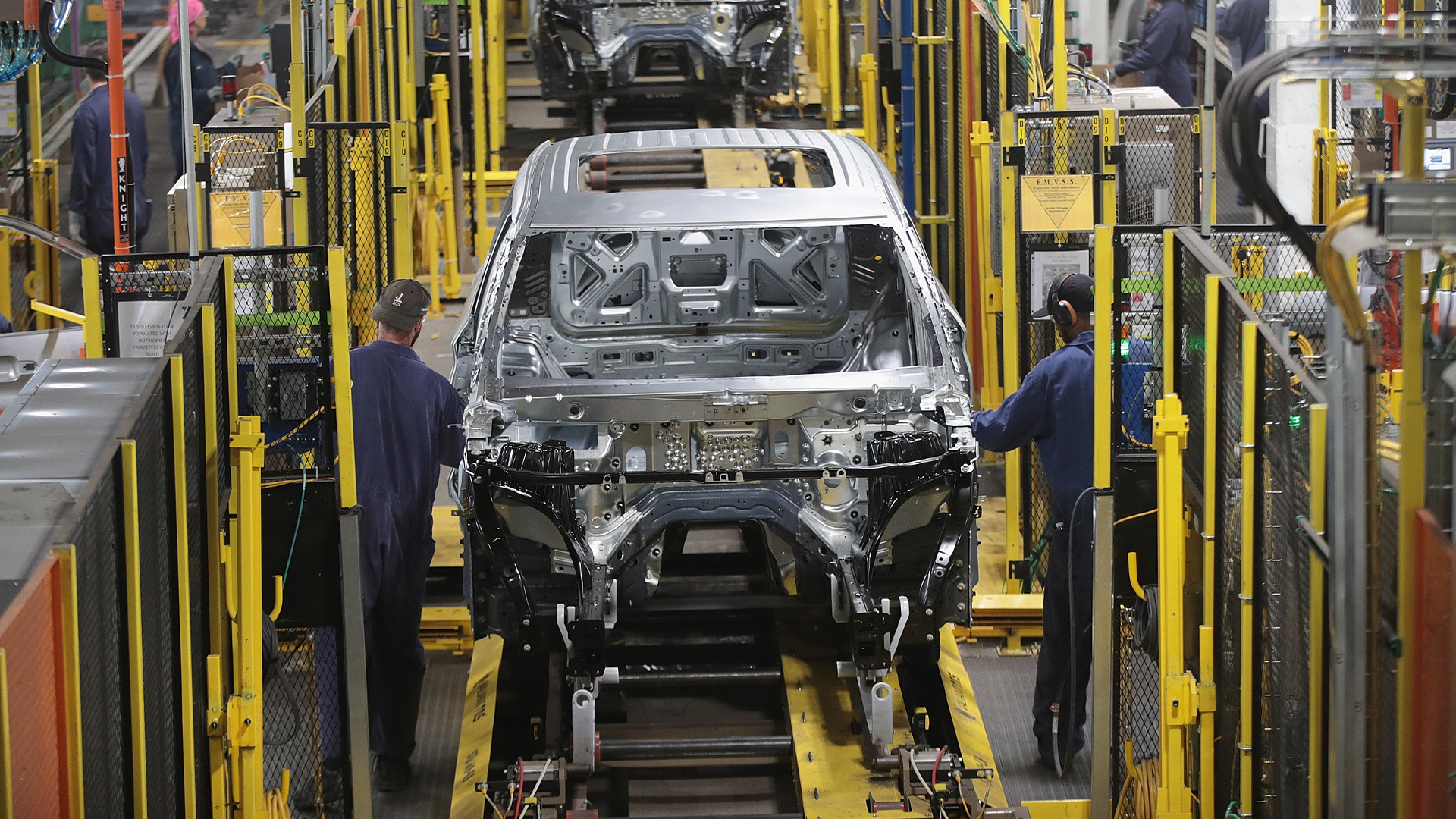
Simone Del Rosario: Gretchen Whitmer is one of those Democratic governors who leads a state won by President-elect Donald Trump. But this week, she’s warning Michiganders one of his policies could harm what drives the state’s economy.
Gov. Gretchen Whitmer: Right now the future of the entire auto industry is at stake. The very core of Michigan’s economy is on the line.
Simone Del Rosario:She says if Trump follows through on his plans to put 25% tariffs on Mexico and Canada, the only winner is China. She says they’d love nothing more than to watch Americans cripple their auto ecosystem all by themselves.
Gov. Gretchen Whitmer: Think about this, 70% of all the auto parts we make in Michigan go directly to our neighbors. Every time a Michigan auto part crosses over the border and gets taxed, those costs will be passed on to you and to consumers at the dealership. Sometimes those parts cross a couple of times throughout production.
Simone Del Rosario: Trump said in November that on his first day on the job, he’ll put 25% tariffs on all products coming from Canada and Mexico. He says those tariffs will stay in place until our neighbors stop the flow of illegal immigration and drugs.
For how the auto industry is preparing for that day, which is this Monday, I want to bring in Erin Keating, executive analyst at Cox Automotive.
Erin, Governor Whitmer is not the only one raising the alarm bells about what’s coming next week. Ford, CEO recently said a lot of their supply chain depends on other countries, and tariffs are going to be challenging for any company. Is there genuine reason to be concerned about Trump’s tariff policies, or do you think auto companies are going to be able to take this in stride?
Erin Keating: No, I think there’s some genuine reason. I mean, we do a lot of back and forth commerce between Mexico and Canada, and it’s not even just the time that the assembled vehicle might arrive over here, or one part might arrive over here. What a lot of people might not realize about the automotive industry is that parts cross and go back and cross and go back over the borders, especially in a state like Michigan, it butts right up against Canada and a lot of the auto manufacturers and suppliers being there. So the threat could really come from actually figuring out, how does, how do the parts, how do the vehicles actually get tariffed? Is it once they’re finally assembled and they come over? Is it every time a part or a piece or a car passes through the borders? So it’s it will be a significant change for a lot of the automakers, especially as it goes on, the longer it goes on, and will definitely affect consumers.
Simone Del Rosario: And it sounds like right now, we don’t have that answer. Will that part get taxed multiple times every time it passes back over, or will it just be like a one time tag?
Erin Keating: Not so far as I know. I have not heard from the administration any or because they’re not in office quite yet. Any details on exactly how that tariff would work. It does seem that Mexico and Canada would be at the most amount of risk for us because of the amount of assembly and parts that come over between those two borders. I mean, certainly we have some manufacturers that are very heavily produced in Asian countries and European countries. We’ve heard some rhetoric around what those tariffs might be, but I think the most concerning and immediate issue is whether Mexico and Canada get impacted.
Simone Del Rosario: And he said he’s doing it on day one. I wanted to ask about why these parts get passed across the border several times over this process. Why does that happen?
Erin Keating: Well, I mean, the way that we assemble cars in the United States. A lot of people, you know what does made in the USA mean anymore, but we have, you know, there’s over 30,000 components to an automotive vehicle, a vehicle being manufactured. And a lot of people don’t realize that just the complexity that goes into designing and building and manufacturing a car. And so every one of those components or pieces are sometimes farmed out to all the suppliers in the industry, and those suppliers can be anywhere around the globe. And so if you’ve got a component which might be made up of several parts, and the parts are coming from various companies, you can imagine how that part might go over to an assembly plant that’s pulling together the component. That component then might re enter the United States for some other part, or for some quality inspection and things like this, and then might get even put back across the border to go to the assembly plant for the final vehicle. So this is where you’ll see the complexity of producing and manufacturing vehicles, and why automakers are concerned about almost seemingly lack of information about how supply chain really does operate in the manufacturing business, especially around such a complex thing as an automotive, I mean, as an automobile.
Simone Del Rosario: Could these tariffs bring that supply chain back to the US? And in your opinion, would that be a good or bad thing?
Erin Keating: You know, I think everyone in the US, you know, agrees that any kind of manufacturing we can bring back within our borders is always great for our economy and great for our people living here. But you know, we need to be cognizant of what does that really mean, and how does that impact pricing for all types of production and manufacturing. It’s not realistic to believe that just because tariffs are put onto things that immediately people are just going to open up manufacturing facilities in the US. First of all, those take years, and never mind that we do have opposing regulations. Sometimes that actually puts more restrictions on where you can build factories and what can you actually use in the factory, so that it’s just such a complex picture. And so a lot of times when we’re caught up in headlines or rhetoric from, you know, campaigns, we’re forgetting about the fact that most things in life today, especially how automated we’re getting with all the new technology we’re getting in all of our products, and expecting not just that we’re getting, but the consumers are expecting in our products. It’s complex, and the supply chain does need to be varied, and we get the best innovation by allowing the right partners in the right places to do the work and to bring the best technology at the least expensive cost for consumers. But that doesn’t mean that we don’t want to advocate for us made products. It just matters on whether we’re actually able to accomplish that.
Simone Del Rosario: Understanding that it’s not next week yet, we haven’t seen the executive order, any paperwork that President Elect Donald Trump plans to sign. What do you think the effect is going to be on pricing in the auto industry if these 25% tariffs are in place?
Erin Keating: So to be honest with you, I think that it’s going to take a little bit for us to see that. And there’s a couple reasons why. One is because, obviously, a lot of the production, a lot of the vehicles have has already happened, right? So manufacturers, everyone was anticipating that some of this might happen. So some of the products have been brought over in advance. We saw that if you looked at port activity and import activity towards the end of the year, we know that across all industries, people were starting to stockpile different things based on the fear of a tariff coming to play. So one, it may take us a minute to get through some of the inventory of pieces and parts that are impacted by that. But two, any manufacturer, not every one of their vehicle lines is manufactured across borders and so forth. And so what they’ll probably be looking at it first is to, how do they do it, sort of for lack of a better word, democratize that expense across their entire production lineup, as opposed to perhaps saying this one vehicle because it is truly and solely impacted by this tariff is going to just shoot up in price to keep things relatively normal for dealers, for consumers to manage, and for the manufacturer to manage, they’ll likely spread that cost out across the model lineup, and so that will make it seem, you know, maybe something will be really high, something will be really low, but will probably, as a consumer, feel relatively normalized.
Simone Del Rosario: Okay, how much influence do you think these big American auto companies are going to have in the Trump administration when it comes to talking about how these tariffs impact the auto industry.
Erin Keating: I think more than maybe we anticipate. We’ve heard all of the CEOs, especially those in Detroit, say they are more than willing and open to have conversations with President Trump and his administration, and there seems to be a lot of individuals being brought into the administration with a lot of business background. So I personally anticipate that there’s gonna be a lot of cooler heads really talking through the impacts of this across the economy, and, you know, trying to figure out which levers really make sense for the goals he’s trying to accomplish, such as less integration, less drugs coming across the borders. There may be better ways to deal with that, but I do think that the automotive industry will have an impact. It’s a large industry. It’s a major engine of the economy here in the US, and I can’t imagine the administration would ignore that.
Simone Del Rosario: We’ll leave it there. Erin Keating, executive analyst at Cox automotive. Thank you so much.











